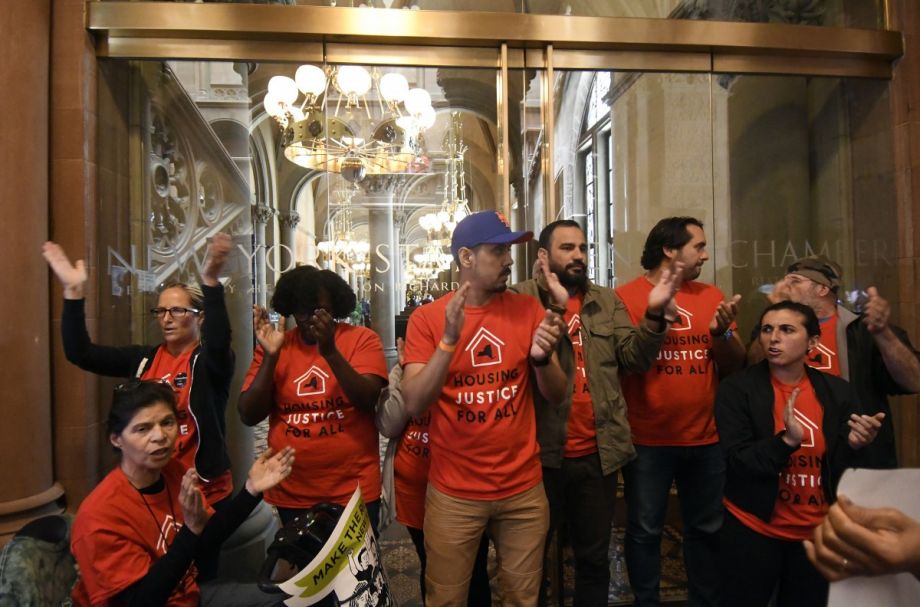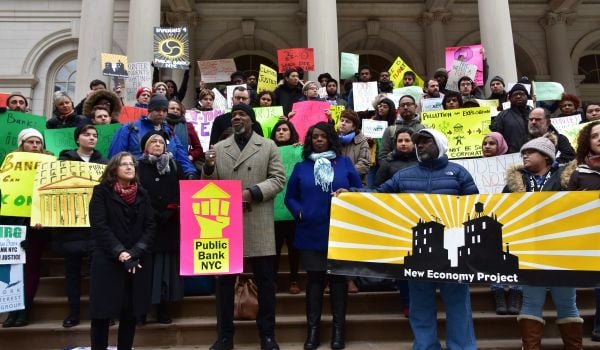There was always going to be a lawsuit.
In June, when state lawmakers in Albany approved a package of bills allowing communities around New York to establish rent-control policies when they face severe housing shortages, they also expanded rent stabilization rules that were already in place in New York City and a few surrounding counties. In the weeks since, as tenant advocates have rejoiced, landlords have huddled, dropping hints that they would file a lawsuit over some aspects of the new law, including a provision that ends vacancy decontrol, which allowed some units to become unregulated when tenants left.
In July, a group of landlords and landlord associations filed the suit, naming the City of New York and the Rent Guidelines Board as defendants. It’s a long complaint, well over 100 pages, and it attacks the rent stabilization laws from a number of angles. The arguments are aimed at the rent stabilization program as a whole, rather than just the expansions that were recently approved by the legislature. The laws violate due process, they argue. And, they say, by so severely restricting their use of the apartments, the laws amount to a “taking” of landlords’ property under the 5th Amendment.
“The [Rent Stabilization Law] deprives property owners of their core rights to exclude others from their property and to possess, use, and dispose of their property,” the complaint says.
The takings argument turns on two concepts. One is that the laws are so onerous that they amount to a “physical taking” of private property by the government — like eminent domain but without any compensation. The other is that they add up to an “uncompensated regulatory taking,” because restricting the amount of rent that landlords can charge lowers the value of the property.
Is either argument likely to prevail?
Case law is varied, but it has generally been very difficult to convince courts that regulations like rent control amount to a taking by the government, says Rick Leland, a partner at the law firm Akerman in New York who also teaches real estate and land-use courses at Columbia University. Leland, who has been a member of the influential Real Estate Board of New York and opposes rent control as a policy, says that the complainants are likely trying to get the case into the U.S. Supreme Court, a strategy Leland is also skeptical of. The Court declined to hear the last big challenge to New York’s rent stabilization laws in 2012, as it does with the vast majority of cases filed before it. Even with the recent rightward lurch of the court, there’s not a lot of clues on how the U.S. Supreme Court would rule on the merits of the takings claims in the landlords’ lawsuits, Leland says.
“I think it’s going to be a difficult lawsuit, and it’s certainly not going to end in the district court,” Leland says.
Property owners have had mixed results with takings claims related to rent control in other jurisdictions. In California, Rob Coldren has made a 40-year career representing owners of mobile home parks, sometimes challenging local rent control laws. In one case, an owner sued the City of Goleta in Santa Barbara County over a law that capped rent increases on land in its mobile home park. An identical law had been in place at the county level when the owner bought the property, but the owner sued when the City of Goleta incorporated and adopted the same law at the local level. The case ping-ponged through the court system; initially the owners, who were represented by Coldren, lost at district court, and then won in the 9th Circuit Court of Appeals, but later the 9th Circuit reheard the case and affirmed the district court’s decision.
In its second decision, the 9th Circuit wrote, “The district court observed that the [owners] ‘got exactly what they bargained for when they purchased the Park — a mobile-home park subject to a detailed rent-control ordinance.’”
Coldren still believes the owners were right that rent control law is a taking of property, especially in many mobile park cases. When you first buy a property, he says, you can decide how to develop it, who to rent to, and what to charge. But mobile park owners under rent control laws are blocked from setting market-rate rents, and from rejecting tenants who the homeowners sublet to. The result is a transfer of wealth, he says, from the owners of mobile-home parks (whose land value is kept artificially low by rent control) to mobile homeowners. Mobile homes in some California parks are selling for many times what they cost wholesale because the cost of the land beneath them is kept low by rent-control laws. Unlike raising taxes or investing in housing construction, rent control is “asking the private property owner to bear a social burden that really ought more properly be imposed on society at large,” Coldren says.
“The question is, when will some court finally decide that government has limits to how much it can extract by way of regulation from private property owners?” Coldren says.
Judith Goldiner is Attorney-In-Charge of the Civil Law Reform Unit at The Legal Aid Society, a member of the Housing Justice for All campaign that helped win the new rent rules in Albany this year. She says that she and other lawyers working on the campaign had “very little” concern about takings claims when helping to structure the policies they were advocating for.
“I’m pretty familiar with takings jurisprudence, and it doesn’t bode well for the landlords’ lawsuit,” Goldiner says.
The complaint is mostly “polemic,” Goldiner says. The landlords in the lawsuit bought the buildings when many of the apartments were already subject to rent stabilization, she says. And courts have found that governments have a right to regulate rent, she says. The stabilization laws in New York don’t prevent landlords from making a “reasonable rate of return” on their investments, but the complainants in this case are simply looking for the extra profit that would come from de-regulating all of their apartments, Goldiner says.
“Essentially, you strip aside all the verbiage and they’re just complaining that they’re not going to make as much as they want to make, and that’s not what courts have found is a taking,” Goldiner says.
It’s true that having regulated rents may lower the resale value of a multi-unit property, Goldiner says. (And sales of multifamily buildings in New York plummeted while the legislature was considering new tenant protections and expansion of rent stabilization, Planetizen reported.) But the current owners bought those buildings under regulation, so they received the discount at the time of purchase, and now they’re hoping for a windfall, Goldiner says.
“It’s a pretty frivolous lawsuit intended to do two things, which is make tenants afraid and also to make a political point,” Goldiner says. “But I don’t think it’s a really serious legal case.”
This article is part of Backyard, a newsletter exploring scalable solutions to make housing fairer, more affordable and more environmentally sustainable. Subscribe to our weekly Backyard newsletter.

Jared Brey is Next City's housing correspondent, based in Philadelphia. He is a former staff writer at Philadelphia magazine and PlanPhilly, and his work has appeared in Columbia Journalism Review, Landscape Architecture Magazine, U.S. News & World Report, Philadelphia Weekly, and other publications.
Follow Jared .(JavaScript must be enabled to view this email address)


















